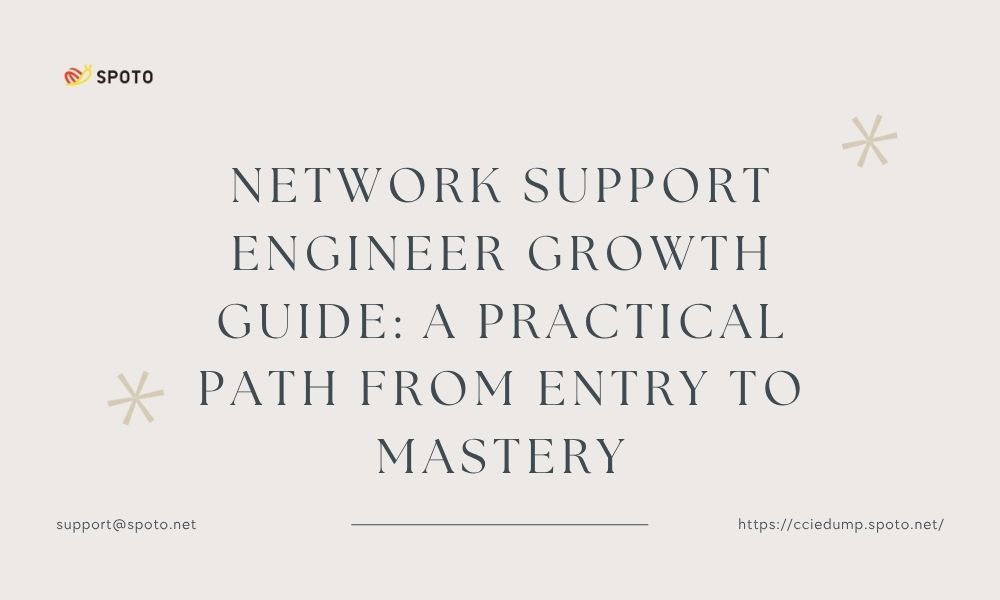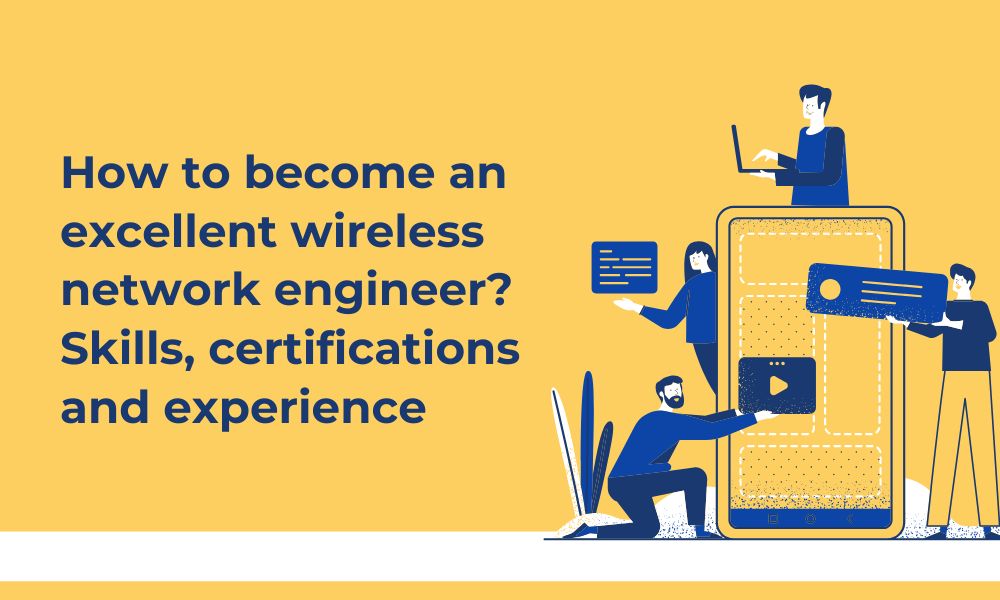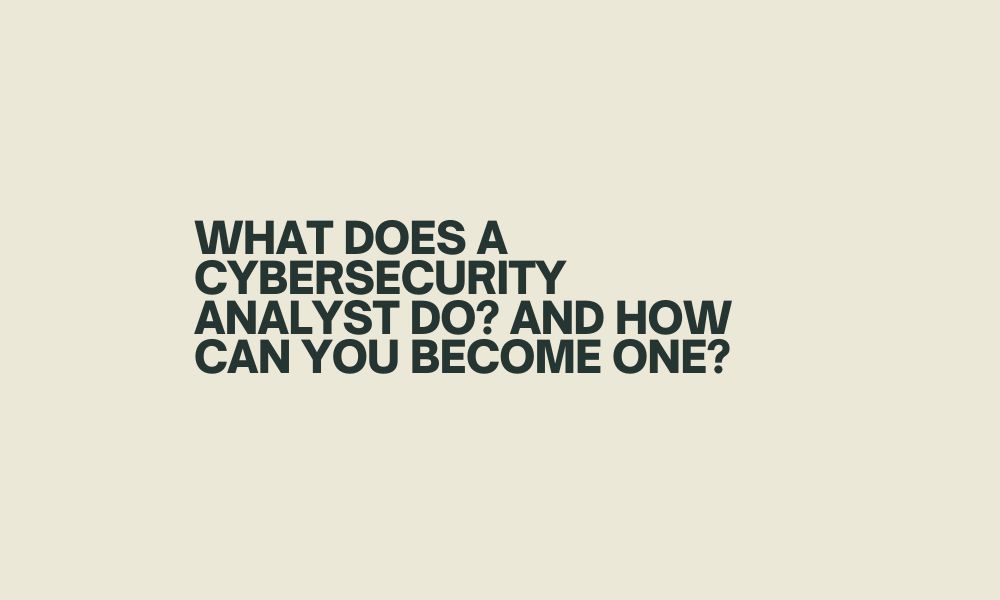TRUSTED BY THE SMARTEST TEAMS IN THE WORLD FOR CERTIFIED CANDIDATES
SPOTO Blogs
Useful learning materials to become certified IT personnel
-
- 584
- SPOTO 2
- 2026-01-29 10:35
-
- 649
- SPOTO
- 2025-07-28 15:29
-
- 587
- SPOTO
- 2025-07-24 16:31
-
- 923
- SPOTO
- 2025-07-24 15:49
-
- 674
- SPOTO
- 2025-07-22 15:43
-
- 840
- SPOTO
- 2025-07-21 14:56
-
- 231
- SPOTO
- 2025-07-18 15:44
-
- 581
- SPOTO
- 2025-07-18 14:41
-
- 638
- SPOTO
- 2025-07-17 15:22
TRUSTED BY THE SMARTEST TEAMS IN THE WORLD FOR CERTIFIED CANDIDATES
SPOTO Blogs
Useful learning materials to become certified IT personnel
-
- 584
- SPOTO 2
- 2026-01-29 10:35
Table of Contents1. The salary of the certificate holder far exceeds the industry average level2. Hard threshold for core network positions in top European and American companies3. Skills highly aligned with the essential needs of the enterprise4. The core springboard from technical experts to management positions5. Global network field "hard currency" certification6. Unlock opportunities for collaboration with high-end projects7. In 2026, the shortage of high-end network talents in Europe and America continues to widen, and CCIE certificate holders are in a state of "supply shortage"8. Master the core problem-solving ability for complex network faults9. Paving the way for long-term career development10. Long-term value-added certification with low renewal costs CCIE, as the expert level peak certification of Cisco's certification system, is not only the identity identifier for high-end network talents in Europe and America, but also the core lever for joining the core network teams of top European and American enterprises and achieving high career advancement in the context of digital infrastructure upgrading and cloud network integration becoming the core architecture of enterprise networks and the explosive demand for cross-border digital networking in the European and American markets in 2026. So let's talk about whether there is still value in obtaining CCIE certification in 2026, and what are the benefits of obtaining CCIE certification: 1. The salary of the certificate holder far exceeds the industry average level According to data from the European and American labor markets in 2026, CCIE holders earn salaries 30%-50% higher than CCNP holders with equivalent experience in positions such as network architects, cloud network integration experts, and enterprise level network operation and maintenance directors, and over 60% higher than unlicensed high-end technical personnel. In core cities such as Silicon Valley and New York in the United States, London and Munich in Europe, CCIE holders generally earn an entry-level annual salary of over $120000. In high paying industries such as technology and finance, senior CCIE holders can earn an annual salary of over $250000, and companies will provide additional benefits such as project bonuses and technology subsidies, which is a direct endorsement of the high salaries in the European and American network fields. 2. Hard threshold for core network positions in top European and American companies By 2026, over 95% of Fortune 500 companies, Cisco Platinum Partners, Silicon Valley tech giants, and European multinational corporations in Europe and America will list CCIE as a necessary requirement for network architects and cloud network integration implementation experts; even for enterprise level network operation and maintenance management positions, CCIE is given priority as a core indicator for recruitment. In the European and American markets, CCIE is the only recognized standard for measuring the ability to independently design, build, and troubleshoot enterprise level core networks, and unlicensed individuals are generally unable to enter the core network technology teams of European and American companies. 3. Skills highly aligned with the essential needs of the enterprise In 2026, Cisco has completed a new iteration of the CCIE syllabus, completely eliminating outdated traditional network technologies and deeply integrating the current core network requirements of European and American enterprises. Including cloud network integration architecture design, zero trust network landing, SDN/SD-WAN cross-border networking, edge computing and industry 4.0 network integration, network security compliance, etc. The process of preparing for CCIE is to master the high-end network technology that is most urgently needed by European and American enterprises in 2026. Holding a certificate means having the practical ability to implement core network projects of European and American enterprises, without the need for additional adaptation to enterprise technical requirements. 4. The core springboard from technical experts to management positions In 2026, European and American companies generally believe that CCIE certification holders not only possess top-notch technical and practical abilities, but also have systematic enterprise level network design thinking, which is the core requirement for network management positions. Even when transitioning from a technical position to a project management position, CCIE's endorsement can provide an absolute advantage in salary grading and project resource allocation. 5. Global network field "hard currency" certification CCIE is a globally recognized network expert level certification with the highest recognition in all European and American countries, without the need for additional local competency certification. In 2026, whether you want to move from Silicon Valley in the United States to Berlin and Amsterdam in Europe, or enter the internet market of Commonwealth countries such as Canada and Australia from London, CCIE can become the "universal language" for resumes. 6. Unlock opportunities for collaboration with high-end projects After obtaining CCIE certification, one can become an official certified expert member of Cisco Europe and America, directly joining the Cisco Europe and America local talent pool. Cisco will recommend the holder to its gold medal partners. At the same time, you can participate in Cisco's high-end technology summits and industry exchange conferences held in Europe and America for free, and get to know high-end networks such as network architects and enterprise CTOs in Silicon Valley and Europe. These networks are the core resources for obtaining high-end project positions and freelance cooperation opportunities in the European and American markets. 7. In 2026, the shortage of high-end network talents in Europe and America continues to widen, and CCIE certificate holders are in a state of "supply shortage" In 2026, Europe and the United States are promoting a new round of digital infrastructure upgrades, leading to a surge in demand for expert level talents who can independently design and build enterprise level core networks. According to Cisco's European and American Industry Report, there will be an annual shortage of over 50000 high-end network talents at the CCIE level in Europe and America by 2026, and this gap is continuing to widen. Companies may even offer additional benefits such as remote work, flexible work arrangements, and immigration benefits to attract outstanding CCIE holders. 8. Master the core problem-solving ability for complex network faults In 2026, the network architecture of European and American enterprises has entered a complex integration stage, and the impact of network failures is extremely wide. Enterprises rely heavily on expert level talents who can quickly locate and solve core network failures, making them an "irreplaceable technical core" in enterprise network teams. 9. Paving the way for long-term career development In 2026, Cisco launched advanced specialized certifications in cloud network integration, network security, industrial networks, and other areas in the European and American markets, with CCIE being the only prerequisite for these specialized certifications. At the same time, CCIE can seamlessly integrate PgMP, ITIL 4 expert level and other certifications, achieving a dual capability upgrade of "technology + management." In addition, CCIE can also adapt to emerging tracks in the European and American markets, which will be in the blue ocean stage in 2026 with fast salary increases. CCIE holders can quickly enter and establish competitive advantages. 10. Long-term value-added certification with low renewal costs CCIE is not a "one-time certification," and renewal can be completed by completing the continuing education units required by Cisco. The channels for accumulating CEUs in the European and American markets are extremely rich, and most of the channels are free or low-cost. At the same time, CCIE's global universality can provide the strongest endorsement for future cross-border projects and overseas technical consulting work for European and American professionals. Conclusion: The additional advantages of taking the CCIE exam in the European and American markets in 2026 include numerous exam locations, flexible appointment scheduling, and abundant local CCIE preparation resources in Europe and America. So, what are you waiting for? Come and take a look at SPOTO's CCIE training camp, where there are abundant learning resources and a team of professional professors to help you pass the CCIE certification exam in one go!   -
- 649
- SPOTO
- 2025-07-28 15:29
Table of Contents1. What is a security architect?2. Security architect salary and job outlook3. Key skills for a security architect4. How to become a security architect?5. Authoritative certification for security architect 1. What is a security architect? Security architects are professional IT personnel who are responsible for designing, building and maintaining the overall network system of an organization. They guard against various potential threats and are key players in the field of network security. As a security architect, you not only need to develop security strategies that meet business needs, but also build a technical architecture to ensure the safe operation of information systems, networks and data. This position is a senior core position in any network security team and is a key force in ensuring the integrity and sustainability of the enterprise security system. Security architects are responsible for designing and continuously updating the organization's overall cybersecurity strategy to respond to the ever-changing threat landscape. They need to introduce new security software or hardware to develop reasonable budget plans, and lead the planning and implementation of various security improvement projects. In actual work, security architects also need to supervise and optimize security testing strategies, including regular vulnerability scans and penetration tests to assess system weaknesses. At the same time, they will regularly conduct threat intelligence analysis to understand potential risks and adjust defense measures in a timely manner. In addition, managing and guiding the cybersecurity team and coordinating resources from all parties are also one of their core responsibilities. To ensure that the organization's network system can operate in compliance, security architects must also ensure that various security measures comply with applicable laws, regulations and industry standards. 2. Security architect salary and job outlook The average hourly wage for a Security Architect in the United States is $71.80. Security Architect hourly wages can range as high as $103.61 and as low as $14.18. The average salary range for a Security Architect varies greatly (as much as 18%), which means there may be many opportunities for advancement and increased pay for a Security Architect based on skill level, location, and years of experience. As organizations' demands for cybersecurity rise and investments in cybersecurity increase, the job market's demand for security architects continues to grow. The U.S. Bureau of Labor Statistics (BLS) predicts that the job outlook for computer and network architects will grow by 5% from 2020 to 2030. Overall, the job market's demand for security architects will remain stable and show an overall upward trend. 3. Key skills for a security architect Technical Skills: Proficiency in network security technologies such as firewalls, intrusion detection systems, and virtual private networks (VPNs). Knowledge of operating systems, programming languages, and database administration is also required. Analytical Skills: Ability to analyze complex security data and identify trends, patterns, and potential threats. Strong problem-solving skills are necessary to effectively resolve security issues. Communication Skills: Good communication skills are required to report security incidents and findings to technical and non-technical stakeholders. Knowledge of Security Frameworks and Standards: Familiarity with industry-recognized security frameworks and standards. 4. How to become a security architect? First, you need to understand security framework engineers and make a career plan. Generally speaking, security architects are not entry-level positions. Security architects are expected to have 5 to 10 years of experience, at least a few years of which are focused on cybersecurity. These should be researched to develop a personalized career plan. Then, you need to learn that to become a security architect, students should at least obtain a bachelor's degree in a related field. It is entirely up to the individual to choose the right courses to promote career development. A bachelor's degree in cybersecurity or a bachelor's degree in computer science are both advantageous majors for becoming a security framework engineer. Secondly, workplace experience is also very important, which requires you to deliberately accumulate relevant experience in school and work in order to help you find a job. It is worth noting that authoritative certification can help you become a security framework engineer because authoritative certification can provide endorsement of your professional ability. 5. Authoritative certification for security architect As Cisco's top expert certification in the security field, CCIE Security certification plays an important role in becoming an excellent security architect. Through CCIE's systematic training, engineers not only have solid practical skills, but also can think about the planning and deployment of security systems from the perspective of the overall architecture. -
- 587
- SPOTO
- 2025-07-24 16:31
Table of Contents1. What is a Network support engineer ?2. What does a network support engineer do day-to-day?3. Average salary of a network support engineer.4. What is the job outlook for network support engineers?5. How to become a network support engineer?6. Essential certifications for network support engineers. 1. What is a Network support engineer ? Network support engineers are IT specialists responsible for designing, setting up, and maintaining corporate computer networks. They play a key role in keeping businesses connected, secure, and operational. Network support engineers are responsible for troubleshooting technical issues, monitoring system performance, and providing user support to ensure uninterrupted access to network services. In addition, they collect data from systems, routers, and other hardware to build and manage a fully operational network. 2. What does a network support engineer do day-to-day? Network support engineers play a key role in technical support and network management in the enterprise. Their responsibilities cover network maintenance, project management, and cross-departmental collaboration. Not only do they need to quickly provide backup solutions and troubleshooting support when a network failure occurs, they also need to conduct post-analysis of system failures and write trend reports to improve network stability and prevent future risks. At the same time, engineers are responsible for formulating proposals, identifying and assisting in the implementation of cost optimization strategies, and ensuring the efficient use of network resources. In addition, they also need to maintain paperwork related to network implementation, assist other departments in solving local technical problems, and coordinate with different departments to promote smooth Linux network design and operation. On the technical level, network support engineers must comprehensively manage the technical resources of the project and the enterprise, ensure that technical support services are always maintained at the best level, and provide professional consultation to customers when necessary to promote the timely and high-quality completion of the project. 3. Average salary of a network support engineer. The average annual salary for a network support engineer in the United States is $92,475, which is equivalent to approximately $44.46 per hour, $1,778 per week, and $7,706 per month. 4. What is the job outlook for network support engineers? The job outlook for network support specialists is bright and strong. According to statistics from the U.S. Bureau of Labor Statistics, overall employment of network support specialists is expected to grow 6% from 2023 to 2033, faster than the average growth rate for all occupations. It is expected that network job openings will average about 62,700 per year over the next decade. 5. How to become a network support engineer? First, you need to obtain a relevant degree and gain practical experience. Most network support engineers have a degree in a computer-related field, such as computer science or information technology. A solid academic foundation in STEM subjects (especially mathematics, computer science or physics) is essential to a career in network support engineering. Secondly, develop practical skills through technical training. Practical skills are essential to being competent for the job. For network support engineers, technical ability is not limited to theory, but also to apply knowledge in practical environments. Through practical training projects, experiments and simulations, you will gain critical experience in configuring network equipment, troubleshooting connection problems, and managing wired and wireless systems. Then, seek career opportunities in network support engineering to add to your work resume. Network support is a dynamic career development direction, and demand is growing in all walks of life. As companies rely more and more on powerful IT infrastructure, skilled professionals who can ensure network security, reliability, and high performance are essential. 6. Essential certifications for network support engineers. If you want to become a network support engineer but don't know what certificate to take, we recommend you to take the CCIE Service Provider certification. It is one of Cisco's top expert-level network certifications, focusing on providing high-performance, scalable, and highly available network solutions for telecom operators, ISPs (Internet service providers), large backbone networks, and cloud service platforms. For network support engineers who want to develop in this field, CCIE SP is a valuable "pass" that not only improves technical depth, but also significantly enhances professional competitiveness. -
- 923
- SPOTO
- 2025-07-24 15:49
Table of Contents1. Define Wireless Network Engineer2. Skills required for a Wireless Network Engineer3. How to become a Wireless Network Engineer4. What are the career prospects and salary of a wireless network engineer?5. Certifications for Wireless Network Engineers 1. Define Wireless Network Engineer Wireless network engineers are IT professionals who are responsible for designing, implementing, managing and troubleshooting wireless networks and wireless infrastructure. They specialize in wireless communication technologies such as Wi-Fi, Bluetooth, cellular networks and other radio frequency (RF)-based systems, maintain and optimize wireless networks and wireless network infrastructure, and solve potential and existing wireless network problems. Wireless network engineers are responsible for designing, deploying, managing, and optimizing wireless network systems to ensure that the network operates efficiently, securely, and stably, including managing firewalls such as Palo Alto, Juniper, or Cisco ASA. First, they use a variety of tools and techniques, such as network performance indicators (NPI), network scanning tools, SNMP, traffic analyzers, packet sniffers, and wireless site surveys, to test, evaluate, and troubleshoot network problems, and model network designs through simulation before deployment. Second, wireless network engineers need to work closely with vendors, enterprise managers, and other network engineers to participate in the planning and improvement of the network from project initiation to implementation to ensure that the business needs of customers are met and the optimized performance of VoIP and other wireless telecommunications equipment is ensured. Third, they are also responsible for configuring and managing various network devices, such as routers, switches, and firewall devices (such as Palo Alto, Juniper, and Cisco ASA). In addition, engineers also need to have radio frequency (RF) link design and verification capabilities to support the construction and optimization of WLAN and other wireless networks, and test and debug network equipment to achieve real-time monitoring and optimization of network performance. In addition, they are also required to write technical documentation, train other employees, and develop data backup and recovery strategies to ensure data integrity and reliability. Finally, the rules of the networking world change over time, and wireless network engineers also need to have a broad understanding of routing protocols (OSPF, EIGRP, and BGP). 2. Skills required for a Wireless Network Engineer The prerequisite for becoming an excellent Wireless Network Engineer is to have the skills required for this profession. As a Wireless Network Engineer, you need to have solid wireless network skills and knowledge. Specifically, wireless network engineers need to understand TCP/IP, including expertise in IP addressing, subnet division, and routing protocols such as OSPF and BGP, because Transmission Control Protocol/Internet Protocol (TCP/IP) is the basis of the Internet and most network infrastructure. Secondly, one of the core tasks of wireless network engineers is to maintain the security and stability of the organization's wireless network, so troubleshooting skills are one of the essential skills. Engineers must be proficient in using diagnostic tools such as packet analyzers, network performance monitors, and configuration management software to ensure smooth network operation. For example, use network monitoring tools to detect and solve potential problems before they worsen. It is worth noting that although technical skills are essential, wireless network engineers must also have excellent customer service capabilities. Engineers often work with customers or internal employees to provide them with necessary support for hardware, software, and network-related issues. Finally, skills such as network infrastructure design and router configuration and management are also important. Wireless network engineers must constantly understand the updates of technology so that the organization's network system and infrastructure can be updated and improved in a timely manner. However, with the emergence of software-defined wide area network (SD-WAN) DevOps, the emergence of 5G, and the emergence and application of new technologies such as virtualization and cloud technology, it is necessary for wireless network engineers to receive new skills training as this may bring changes to the way they operate. 3. How to become a Wireless Network Engineer It usually takes 2 to 5 years to become a wireless network engineer, depending on your starting point and education path. Here is a brief breakdown: First, becoming a wireless network engineer requires a certain level of education, with a science degree in computer science often favored by employers. It may take 2 to 4 years to obtain an associate or bachelor's degree in computer networking, information technology, or a related field. Second, industry-recognized certifications can make your resume stand out, and industry-recognized certifications can be obtained in a few months to a year, usually at the same time or after formal education. Finally, having the right work experience in the workplace can make you more likely to get a job, and entry-level IT positions (such as help desk, network technician) provide the practical experience needed to advance to wireless network positions. This may take 1 to 3 years, depending on the content of the work and development opportunities. 4. What are the career prospects and salary of a wireless network engineer? The job outlook for wireless network engineers is expected to be very strong in the future. According to the U.S. Bureau of Labor Statistics, employment of wireless network engineers is expected to grow 5% from 2019 to 2029, faster than the average for all occupations. The average annual salary for a senior wireless network engineer (CCNP certification) is about $87,772 to $106,566. The hourly wage for freelancers is only $24.57. Of course, the salary of a wireless network engineer is also affected by many other factors, such as work location, work experience, etc. 5. Certifications for Wireless Network Engineers CCIE Enterprise Wireless is an expert wireless network certification launched by Cisco. It is one of the most valuable technical certifications in the career of wireless network engineers. For professionals who want to become senior wireless network engineers or have deep capabilities in enterprise wireless network design, implementation and optimization, this certification can make people who obtain this certification stand out in job hunting and easily enter large multinational companies, governments, universities, medical and other high-end industries. It is also the recruitment threshold or priority condition for many senior positions in enterprises (such as wireless architects, senior network engineers, and technical consultants). -
- 674
- SPOTO
- 2025-07-22 15:43
Table of Contents1. What does a cybersecurity analyst do?2. Job outlook and salary of cybersecurity analyst3. What tools and skills do cybersecurity analysts need to use?4. What certifications are helpful in becoming a Cybersecurity Analyst? Have you ever thought about this question? In the context of modern enterprises, governments and various organizations increasingly relying on digital systems, what professions are silently guarding the network security of organizations and enterprises? In fact, as the "first responder" of the network security defense line, Cybersecurity Analyst play an irreplaceable role in discovering threats, analyzing risks, preventing attacks and ensuring the security of information assets. Cybersecurity Analyst are professionals who are responsible for detecting, analyzing and eliminating security threats to network systems. Their main responsibilities are to identify potential network attacks, analyze network security incidents, repair vulnerabilities in system networks, and ensure the confidentiality, integrity and availability of data and systems. They not only monitor network anomalies in real time, but also actively build defense systems and predict potential risks. Cybersecurity analysts are involved in many industries, including business, finance, criminal justice, and more. This article will take a deep dive into what a cybersecurity analyst does, the skills required to pursue this career, and how to get started. If you want to start a new career in cybersecurity by developing job-related skills and obtaining respected qualifications, this article will provide you with career information and reference advice. 1. What does a cybersecurity analyst do? A Cybersecurity Analyst is responsible for preventing or responding to cyberattacks on their organization's computer systems and networks. Cybersecurity Analysts typically work with other IT professionals or senior management to make security recommendations, create best practices, and design disaster recovery plans. The job responsibilities of a Cybersecurity Analyst include the following: Threat Monitoring and Detection: Continuously monitor the organization's network, systems, and applications using a variety of security tools and techniques. Regularly assess the security vulnerabilities of the organization's IT infrastructure. When a security incident occurs, a cybersecurity analyst needs to quickly control the incident, investigate its root cause, and work with other teams to mitigate the impact and prevent similar incidents from happening again. Assist in the development and implementation of security policies and procedures, ensuring that these policies meet industry best practices and regulatory requirements. 2. Job outlook and salary of cybersecurity analyst As cyber attacks become increasingly sophisticated and data breaches occur more frequently, companies and organizations are paying more and more attention to cyber security in order to protect their network systems and digital assets. As a key role in protecting digital assets and information security, the market demand for security analysts continues to grow rapidly. From 2023 to 2033, the employment prospects of security analysts are expected to grow by 33%. This is equivalent to an estimated 180,700 new job vacancies. In comparison, the average growth rate for all occupations is only 4%. The average annual salary for a Cybersecurity Analyst in the United States is $99,400. That works out to about $47.79 per hour. That works out to $1,911 per week or $8,283 per month. The average salary range for a Cybersecurity Analyst varies greatly (as much as $36,000), which means there may be many opportunities for advancement and increased pay based on skill level, location, and years of experience. 3. What tools and skills do cybersecurity analysts need to use? First, a cybersecurity analyst needs to be proficient in cybersecurity technologies, such as firewalls, intrusion detection systems, and virtual private networks (VPNs). In addition, knowledge of operating systems, programming languages, and database management is a must. Secondly, due to the subtlety and diversity of potential cyber threats, strong problem-solving skills are necessary for cybersecurity analysts to be able to analyze complex security data and identify trends, patterns, and potential threats to effectively solve security problems. Finally, they also need good communication skills to report security incidents and findings to technical and non-technical stakeholders.In using tools, they need to be proficient in using Microsoft Excel, Google Sheets, SQL, Drawing, R or Python, SAS, Microsoft Power BI and other tools 4. What certifications are helpful in becoming a Cybersecurity Analyst? Obtaining an industry-leading certification can help you improve your interview success rate and career advancement opportunities. CCIE Security certification demonstrates mastery of planning, design, deployment, operation, and optimization of complex enterprise security network solutions. Lead the transformation of security solutions with the Cisco Certified Internet Expert (CCIE) Security certification. -
- 840
- SPOTO
- 2025-07-21 14:56
Table of Contents1. What are Collaborative Engineers? And their job responsibilities2. Job Outlook for Collaborative Engineers3. How much is a collaborative engineer paid?4. What skills do collaborative engineers need?5. What qualities make you a collaborative engineer?6. What kind of certification can help become a collaborative engineer? 1. What are Collaborative Engineers? And their job responsibilities Collaboration Engineers are responsible for designing, implementing, and maintaining communication and collaboration technologies within an organization, providing the necessary technical and engineering support for the organization's current business to ensure seamless teamwork and efficient work efficiency. They work closely with IT teams and end users to optimize system performance, resolve issues, and enhance workflows. In-depth knowledge of networks, security protocols, and collaboration software is essential for this position. In an organization, the work content group of collaborative engineers should include the following aspects: Collaboration Engineer is responsible for the service ownership management of new collaboration services, ensuring that the overall delivery, operation and maintenance of the services meet the expected standards. At the same time, they also need to define the technical architecture and provide implementation support, that is, design the architecture from a technical perspective to support the deployment and implementation of new collaboration services. In order to improve the overall service quality and user experience, and promote the continuous enhancement and improvement of collaboration services, collaboration engineers should regularly evaluate the stability of the system and introduce new features. In addition, they should customize the workplace roadmap that supports the collaboration field and assist in planning the development direction and implementation path of the future collaboration platform. Participate in the support of future video network and service plans, and participate in the planning, design, implementation and continuous support of future video and network services. Finally, collaboration engineers also need to upgrade the existing platform according to business needs, expand system capacity and functions, and work with the network team to manage voice quality and provide capacity recommendations to ensure that the end-to-end voice communication quality meets the expected standards. 2. Job Outlook for Collaborative Engineers The job outlook for engineers continues to show a high demand for talent. According to the U.S. Bureau of Labor Statistics (BLS), career forecasts and characteristics of practitioners in engineering and computer-related career fields are expected to grow significantly. Industrial engineering is one of the occupations expected to experience growth, with a growth rate of 11.7% by 2032. This highlights the growing demand for experts who are proficient in process and system optimization in all walks of life. Collaborative engineers, as one of the related occupations, also show strong market demand growth. 3. How much is a collaborative engineer paid? The average annual salary for a Collaborative Engineer in the United States is $108,117. That works out to about $51.98 per hour. That equates to $2,079 per week or $9,009 per month. The average salary range for a Collaborative Engineer varies greatly (as much as $41,500), which means there may be many opportunities for advancement and increased pay for a Collaborative Engineer based on skill level, location, and years of experience. 4. What skills do collaborative engineers need? Collaboration engineers should first have the ability to apply multiple programming languages, be able to develop scalable software to support the delivery of unified communications and collaboration products, and write accurate and complete customer support documentation. They usually have rich software development experience, high-quality coding practices, and are able to design and implement cross-platform software solutions. Secondly, this role also needs to participate in solution planning, provide design advice, be responsible for solution construction and configuration, clarify the technical requirements of endpoint protection, and assist in the formulation of relevant policies and operating procedures. Finally, good teamwork skills are essential for career development, including effective organizational coordination skills, communication skills, and positive interpersonal interaction skills, which will help to obtain better development opportunities in a complex workplace environment. 5. What qualities make you a collaborative engineer? To become a collaborative engineer, you need to be able to effectively combine technical capabilities with teamwork spirit. On the one hand, you need to develop your professional skills, but at the same time, on the other hand, you must be able to make use of your professional skills in teamwork. This requires job seekers to have work experience in related fields and teamwork thinking. Secondly, collaborative engineers also need to have communication skills and cross-departmental coordination capabilities, and be able to clearly convey complex technical content to colleagues or customers from different backgrounds, help the team reach a consensus, and promote the efficient implementation of the project. 6. What kind of certification can help become a collaborative engineer? We recommend you to obtain CCIE Collaboration certification, which can demonstrate your advanced skills in planning, designing, implementing, operating and optimizing complex enterprise collaboration solutions. With the Cisco Certified Internet Expert (CCIE) Collaboration certification, you can show that you have all the skills to become a collaboration engineer and increase your chances of success in the application. -
- 231
- SPOTO
- 2025-07-18 15:44
Table of Contents1.What Is a Network Designer?2. Network Designer Job Skills3. Salary and Career Outlook for Network Designers 4.What Education is Required to Become a Network Designer?5. Are skills and experience important to become a Network Designer?6. How to obtain authoritative certification for the Network Designer profession? 1.What Is a Network Designer? A Network Designer plays a key role in building the digital backbone of an organization. They are responsible for designing, developing, and maintaining tailored computer networks that enable secure, efficient communication and data sharing across teams and systems. By understanding business goals, they create cost-effective network solutions that support current operations and future growth. In addition to planning the network architecture, Network Designers may also provide technical support, troubleshoot connectivity issues, and ensure the system aligns with both performance needs and security standards. Their work helps keep organizations connected, productive, and prepared for evolving technological demands. Key Responsibilities of a Network Designer: Design, implement, and manage tailored computer networks and systems to meet specific organizational needs Evaluate current network infrastructures and assess emerging technologies for integration and improvement Install and maintain key network components, including LANs, WANs, intranets, and other data communication systems Perform network security assessments and deploy protective measures such as firewalls and security protocols Identify and resolve technical issues affecting network performance and connectivity Lead and oversee a team of network engineers to ensure efficient project execution Enhance and modernize existing network infrastructure to support scalability and performance 2. Network Designer Job Skills Successful network designers need to have deep technical knowledge, strategic planning capabilities, and strong communication skills, including professional skills in local area networks (LAN), wide area networks (WAN), wireless networks (WLAN), and data center networks. Secondly, in today's environment, it is becoming increasingly important to understand traditional infrastructure and cloud/hybrid architectures. Network designers need to have experience in network deployment and hybrid architecture design for mainstream cloud platforms such as AWS, Azure, and GCP. With these skills, network designers can play a key role in building secure, scalable, and high-performance networks to support modern business needs. Finally, in order to improve work efficiency and professionalism, network designers must be able to proficiently use network design and simulation tools (such as Cisco Packet Tracer, GNS3, EVE-NG) and have the ability to draw network topology diagrams and write documents. 3. Salary and Career Outlook for Network Designers The career outlook for Network Designers, also known as Computer Network Architects, is highly promising. Employment in this field is projected to grow by 13% from 2023 to 2033, which is much faster than the average for all occupations. This growth is primarily driven by the increasing reliance on computer networks and the heightened need for businesses to safeguard their systems against cyber threats. Although the U.S. Bureau of Labor Statistics (BLS) does not provide specific data for "Network Designers," related roles such as computer network architects indicate a strong demand for skilled professionals in network design. As businesses across various industries continue to prioritize secure and advanced network infrastructures, the demand for Network Designers is expected to remain robust in the coming years. The median hourly wage for web designers in the United States is $47.24. Hourly wages across the country typically range from $24.28 to $61.54. Such a wide salary range (close to $18) shows that there is significant variation in salary based on factors such as skill level, geographic location, years of experience, and potential opportunities for career advancement and higher pay. 4.What Education is Required to Become a Network Designer? To pursue a career as a network designer, also known as a computer network architect, candidates typically need to meet specific educational requirements. According to authoritative sources, a bachelor's degree in a related field is generally required. 5. Are skills and experience important to become a Network Designer? Of course, skills and experience are part of what employers look for when applying for a job. If you want to become a web designer, we recommend that you gain experience while studying at school. Work experience in a large company will hone your abilities and highlight your strengths. 6. How to obtain authoritative certification for the Network Designer profession? Are you also worried about what certification to take and whether it is really helpful for your career? This article recommends taking CCDE (Cisco Certified Design Expert).This certification is the top network design certification launched by Cisco, focusing on high-level network architecture design and business-driven solution formulation. It is one of Cisco's most important expert-level certifications after CCIE. CCDE does not examine device configuration and command line operations, but focuses more on network architecture capabilities and design decision-making thinking. It is suitable for people who want to become network designer, technical directors or senior consultants. -
- 581
- SPOTO
- 2025-07-18 14:41
Table of Contents1. What is a Security Analyst?2. Analysis of career prospects of security analyst3. Why and how to become a security analyst?4. Begin your Security Analyst career with Cisco 1. What is a Security Analyst? Security analysts are IT professionals who analyze risk vulnerabilities in company networks and repair and improve possible external threats and emergencies. They play an important role in protecting sensitive organizational information and ensuring the safe operation of the organization. The core of a security analyst's job responsibilities is to maintain the security of an organization's network and important assets. This ranges from controlling file access and credentials, maintaining firewalls and network updates, and actively trying to hack into systems to find vulnerabilities and weaknesses. They must be able to protect the company's digital assets from unauthorized corporate and personal access by continuously monitoring the organization's network, systems, and applications using a variety of security tools and techniques. This includes protecting online and local infrastructure, screening indicators and data to filter suspicious activities, and discovering and reducing risks before data leaks occur. Security analysts also regularly assess the security vulnerabilities of the organization's IT infrastructure. Generate relevant data reports for IT administrators and business managers to evaluate the feasibility of existing security policies. And they must have the ability to work across departments so that they can deal with incidents in a timely and effective manner in the face of sudden major crises. In order to be better qualified for the work of security analysts, employers often require job seekers to have certain professional skills when applying for a job, which can help them to be handy when actually dealing with security issues. First of all, security analysts, like other information technology personnel, need to have network programming experience. Because network security analysts are responsible for protecting digital infrastructure, network security professionals usually need to have certain basic programming experience and be familiar with basic programming languages such as C, C++, PHP, Perl and Java. Secondly, because network security issues will continue to change over time, security analysts also need to be able to have a rigorous work attitude and an enterprising mentality, and continue to learn and improve their basic qualities in their professional fields at work. Finally, due to the continuous development of automation and cloud computing technologies, security analysts must also learn to apply these technologies to ensure the security of the enterprise, such as Python scripts, SOAR tools (such as Phantom, Cortex XSOAR) 2. Analysis of career prospects of security analyst Organizations across all industries rely on security analysts to protect their sensitive information, financial assets, and reputation. This high demand ensures that security analysts have a steady job market demand and good career advancement prospects. The average annual salary for a Security Analyst in the United States is $107,334. That works out to about $51.60 an hour. That works out to $2,064 per week or $8,944 per month. The average salary range for a Security Analyst varies greatly (as much as $38,500), which means there may be many opportunities for advancement and increased pay based on skill level, location, and years of experience. 3. Why and how to become a security analyst? Becoming a security analyst is not only a highly technical and challenging career choice, but also a valuable and meaningful job in today's digital age. With the increasing frequency and complexity of cyber attacks, various organizations are in urgent need of professional security talents to protect their critical data and information systems. As a security analyst, you will be at the forefront of information defense, monitoring network threats in real time, analyzing attack behaviors, discovering security vulnerabilities, and formulating effective response strategies, which will not only bring a strong sense of professional achievement, but also continue to hone your technical and logical thinking skills. In addition, the career path of security analysts is clear and has great development space. With the accumulation of experience, they can be promoted to security architects, security operations supervisors, and even CISOs (Chief Information Security Officers); and in terms of salary and benefits, this position has good salary and benefits worldwide, and can achieve considerable growth with the improvement of their own skills and abilities. Becoming a security analyst often requires starting from the following aspects: education level, work experience, professional ability and authoritative certification.Security analysts often need to obtain a bachelor's degree in Cybersecurity (or a closely related field such as Mathematics, Computer Science, or Engineering), but academic qualifications alone are not enough. You need to gain relevant experience in actual combat, which is also valued by employers and can make you stand out in interviews and actual combat.Moreover, in actual work, we must take it seriously and constantly accumulate and improve our professional skills in order to deal with different sudden network security issues.Finally, you can learn to improve your competitiveness in the workplace by taking the path of obtaining authoritative certification. 4. Begin your Security Analyst career with Cisco CCIE Security (Cisco Certified Internetwork Expert - Security) is a top network security certification launched by Cisco. It is one of the most valuable and recognized technical certifications in the field of network security worldwide. It is aimed at professionals with advanced technical capabilities who can design, deploy, operate and troubleshoot complex network security systems. CCIE Security certification is of great help to those who want to become an excellent security analyst. It can not only significantly improve your technical capabilities, but also make you stand out in the job market. -
- 638
- SPOTO
- 2025-07-17 15:22
Table of Contents1. What is a cloud engineer?2. How to become a cloud engineer3. Job prospects and salaries for cloud engineers4. What certifications do cloud engineers need? The application and popularity of cloud computing has profoundly changed the operation mode and IT landscape of enterprises. Cloud computing provides easy scalability, lower hardware costs, and higher operational elasticity. This has led to a rapid growth in interest in cloud engineers, who bridge the gap between traditional IT and cloud infrastructure. They ensure that organizations can fully exploit the potential of cloud computing while maintaining efficiency, cost-effectiveness, and scalability. 1. What is a cloud engineer? A cloud engineer is an IT specialist who builds and maintains cloud computing applications and infrastructure. As a cloud engineer, you will work behind the scenes, primarily designing and building IT infrastructure for an enterprise and setting up and maintaining an organization's cloud services and cloud service systems. Are you also curious about the daily job responsibilities of a cloud engineer? Let's take a look at them in detail. The roles and responsibilities of a cloud engineer involve a variety of tasks that are performed on a daily basis. The responsibilities of a cloud engineer include, but are not limited to: creating and integrating cloud-based applications that meet company requirements and allow all network users to communicate and access data securely; regularly using various network tools to assess the security and possible risks of the enterprise network; keeping a close eye on the progress in the field of cloud computing, and working with cloud engineers and other team members to create and maintain cloud applications to provide the best cloud computing solutions for enterprises and customers; maintaining and storing the company's data information through cloud computing; automating specific system operations to improve efficiency and speed; developing, building, and implementing cloud-based modular applications; regularly evaluating computer systems and providing performance enhancement recommendations, etc.; providing necessary cloud support services to help enterprises use applications in new ways, etc. In order to be competent for the above-mentioned work content, cloud engineers need to have comprehensive professional skills.To become an excellent cloud engineer, you often need to have good professional skills. Including but not limited to, proficiency in various programming languages ​​Java, Python, C++, JavaScript (deep professional knowledge) Python, Shell scripts, PowerShell (working knowledge) to maintain cloud platforms and cloud infrastructure; have a solid reserve of core network knowledge, and have a deep understanding of data structures, algorithms, software architectures, cloud platforms, and network security operation processes. Ability to independently design and maintain specific network frameworks and tools, such as Git, Docker, development frameworks Terraform, Kubernetes, and CloudFormation. In addition, good soft skills, problem solving, teamwork, system thinking, and project management capabilities can also make you stand out in internal organizational cooperation and communication. 2. How to become a cloud engineer Becoming a cloud engineer often requires your resume to have conditions that attract employers. Education is often the foundation and stepping stone. The profession of cloud engineer usually requires job seekers to have a bachelor's degree in computer science, information engineering and other fields. Larger companies will also require job seekers to have higher education or professional certification. Secondly, your internship experience and work content can convey the signal that you have the ability to get started faster during the interview. Therefore, it is best to accumulate more practical experience to enrich your resume during school or work. Furthermore, professional skills are still the core workplace competitiveness. You need to consolidate your professional skills, especially the relevant skills in the above-mentioned cloud computing field. Finally, we must continue to pay attention to the changes in the requirements and needs of the employment market and the macro environment for talents, and turn passivity into initiative. 3. Job prospects and salaries for cloud engineers As the demand for cloud migration continues to rise among all types of companies (from startups to large state-owned enterprises and multinational corporations) (such as AWS, Azure, Alibaba Cloud, Tencent Cloud, Huawei Cloud, etc.), this has directly led to a large demand in the job market for talents in cloud infrastructure, operation and maintenance, network, deployment, security, etc.The global cloud computing market is expected to reach $832 billion by 2026More than 94% of enterprises use cloud services (including hybrid cloud), and by 2026, the world will have a shortage of more than 4 million cloud-related technical personnel. The average hourly wage for a Cloud Engineer in the United States will be $62.89. The hourly wage range for Cloud Engineers is between $87.26 and $23.56. And, the average Cloud Engineer salary varies greatly (up to 18%). This means there are many opportunities for advancement and increased pay based on skill level, location, and years of experience. 4. What certifications do cloud engineers need? Possessing a professional certification that is highly relevant and valuable can help you open doors to companies and jobs and achieve better career advancement.CCIE Data Center (Cisco Certified Internet Expert: Data Center) is one of the world's top IT network certifications. Its deep knowledge in infrastructure, virtualization, network automation, hybrid cloud connectivity, etc. is of great help in becoming a senior cloud engineer or cloud architect.














